_bullet.svg.png.webp) Line E | ||||||||||||||||||||||||||||||||||||||||||||||||||||||||||||||||||||||||||||||||||||||||||||||||||||||||||||||||||||||||||||||||||||||||||||||||||||||||||||||||||||||||||||||
|---|---|---|---|---|---|---|---|---|---|---|---|---|---|---|---|---|---|---|---|---|---|---|---|---|---|---|---|---|---|---|---|---|---|---|---|---|---|---|---|---|---|---|---|---|---|---|---|---|---|---|---|---|---|---|---|---|---|---|---|---|---|---|---|---|---|---|---|---|---|---|---|---|---|---|---|---|---|---|---|---|---|---|---|---|---|---|---|---|---|---|---|---|---|---|---|---|---|---|---|---|---|---|---|---|---|---|---|---|---|---|---|---|---|---|---|---|---|---|---|---|---|---|---|---|---|---|---|---|---|---|---|---|---|---|---|---|---|---|---|---|---|---|---|---|---|---|---|---|---|---|---|---|---|---|---|---|---|---|---|---|---|---|---|---|---|---|---|---|---|---|---|---|---|---|
 Bolívar station entrance | ||||||||||||||||||||||||||||||||||||||||||||||||||||||||||||||||||||||||||||||||||||||||||||||||||||||||||||||||||||||||||||||||||||||||||||||||||||||||||||||||||||||||||||||
| Overview | ||||||||||||||||||||||||||||||||||||||||||||||||||||||||||||||||||||||||||||||||||||||||||||||||||||||||||||||||||||||||||||||||||||||||||||||||||||||||||||||||||||||||||||||
| Termini | ||||||||||||||||||||||||||||||||||||||||||||||||||||||||||||||||||||||||||||||||||||||||||||||||||||||||||||||||||||||||||||||||||||||||||||||||||||||||||||||||||||||||||||||
| Stations | 18 | |||||||||||||||||||||||||||||||||||||||||||||||||||||||||||||||||||||||||||||||||||||||||||||||||||||||||||||||||||||||||||||||||||||||||||||||||||||||||||||||||||||||||||||
| Service | ||||||||||||||||||||||||||||||||||||||||||||||||||||||||||||||||||||||||||||||||||||||||||||||||||||||||||||||||||||||||||||||||||||||||||||||||||||||||||||||||||||||||||||||
| Type | Rapid transit | |||||||||||||||||||||||||||||||||||||||||||||||||||||||||||||||||||||||||||||||||||||||||||||||||||||||||||||||||||||||||||||||||||||||||||||||||||||||||||||||||||||||||||||
| System | Buenos Aires Underground | |||||||||||||||||||||||||||||||||||||||||||||||||||||||||||||||||||||||||||||||||||||||||||||||||||||||||||||||||||||||||||||||||||||||||||||||||||||||||||||||||||||||||||||
| Operator(s) | Metrovías | |||||||||||||||||||||||||||||||||||||||||||||||||||||||||||||||||||||||||||||||||||||||||||||||||||||||||||||||||||||||||||||||||||||||||||||||||||||||||||||||||||||||||||||
| Daily ridership | 94,000 (2018)[1] | |||||||||||||||||||||||||||||||||||||||||||||||||||||||||||||||||||||||||||||||||||||||||||||||||||||||||||||||||||||||||||||||||||||||||||||||||||||||||||||||||||||||||||||
| History | ||||||||||||||||||||||||||||||||||||||||||||||||||||||||||||||||||||||||||||||||||||||||||||||||||||||||||||||||||||||||||||||||||||||||||||||||||||||||||||||||||||||||||||||
| Opened | 1944 | |||||||||||||||||||||||||||||||||||||||||||||||||||||||||||||||||||||||||||||||||||||||||||||||||||||||||||||||||||||||||||||||||||||||||||||||||||||||||||||||||||||||||||||
| Technical | ||||||||||||||||||||||||||||||||||||||||||||||||||||||||||||||||||||||||||||||||||||||||||||||||||||||||||||||||||||||||||||||||||||||||||||||||||||||||||||||||||||||||||||||
| Line length | 12 km (8.07 mi) | |||||||||||||||||||||||||||||||||||||||||||||||||||||||||||||||||||||||||||||||||||||||||||||||||||||||||||||||||||||||||||||||||||||||||||||||||||||||||||||||||||||||||||||
| Character | Underground | |||||||||||||||||||||||||||||||||||||||||||||||||||||||||||||||||||||||||||||||||||||||||||||||||||||||||||||||||||||||||||||||||||||||||||||||||||||||||||||||||||||||||||||
| Track gauge | 1,435 mm (4 ft 8+1⁄2 in) | |||||||||||||||||||||||||||||||||||||||||||||||||||||||||||||||||||||||||||||||||||||||||||||||||||||||||||||||||||||||||||||||||||||||||||||||||||||||||||||||||||||||||||||
| Electrification | Catenary 1500 V DC | |||||||||||||||||||||||||||||||||||||||||||||||||||||||||||||||||||||||||||||||||||||||||||||||||||||||||||||||||||||||||||||||||||||||||||||||||||||||||||||||||||||||||||||
| ||||||||||||||||||||||||||||||||||||||||||||||||||||||||||||||||||||||||||||||||||||||||||||||||||||||||||||||||||||||||||||||||||||||||||||||||||||||||||||||||||||||||||||||
Line E of the Buenos Aires Underground runs from Retiro to Plaza de los Virreyes, a total distance of 12 km. Opened in 1944, the Line E was the last completely new line to be added to the Buenos Aires Underground, until 2007 when Line H was opened. The line has a history of being re-routed and extended due to having been historically the line with the lowest passenger numbers on the network.
History


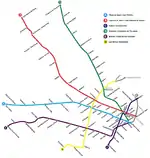

Line E was opened on 20 June 1944, after construction began in 1938, with an original route that ran from Constitución railway station to General Urquiza. Soon after, it was decided to abandon the terminus at Constitución (which also served as the connection with Line C) and instead reroute the line towards the Plaza de Mayo.
Work began in 1957, and in 1966 the San José, Independencia, Belgrano and Plaza de Mayo (now Bolívar) stations were opened to the public by president Arturo Umberto Illia. For many years, the two stations that had been closed as a result of the Line E re-route remained unused until the mid-1990s when one was converted into a workshop to service the rolling stock of the line.[3]
The line was further extended in 1973 to José María Moreno and then again in 1985 to Plaza de los Virreyes.[4] The PreMetro E2 tramway was completed in 1987 and was linked to Line E with the intention of connecting a larger Premetro network to the line, although this never materialised following privatisation.[5]
Under the private operation of the Subte by Metrovías, the colour of the line was changed from yellow to purple during the 1990s. Purple had previously been used for Line C, while yellow is now used for Line H.[6]
Extension to Retiro
As part of a general effort to extend the Buenos Aires Underground, it was decided to extend Line E from Bolívar to Retiro railway station (with intermediate stations at Catalinas and Correo Central) where it would re-connect with Line C and the Mitre Line, and eventually Line H when its extension was completed. By 2014, all the major structural works had been completed on the three new stations with the tracks and signalling systems still to be completed.[7]
In July 2015, the City of Buenos Aires confirmed that, despite the advanced state of the works, the extension would not be opened until 2019 citing delays that came about as a result of the transfer of the works from the National Government to the City Government in 2012. The city completed the additional work required by the new deadline. On Monday 3 June 2019 the extension to Retiro was completed. The extension was expected to increase ridership on the line by 25%.[8][9]
Rolling stock
.JPG.webp)
The line originally used Siemens-Schuckert Orenstein & Koppel rolling stock during its inauguration and for many years after. However, this was later replaced by similar CAF-GEE rolling stock purchased in 1968 which still serves on the line today.[10][11] In 2006, 64 of the CAF-GEE cars were to be refurbished, but this was ultimately abandoned.[12]
It is expected that with the line's extension to Retiro completed in 2019, the CAF GEE rolling stock will be retired and replaced by Fiat-Materfer cars, and possibly 50 Siemens O&K cars refurbished by the Emepa Group and Alstom.[13][14][8]
Ghost stations
There are two ghost stations on the line – San José vieja and Constitución. These formed part of the line's original Line E route towards Constitución railway station until the line was re-routed in 1966. Both stations have been used as workshops and storage areas for the line's rolling stock. It has also been evaluated using the two stations and their corresponding tunnels as the southern part of Line F since that line's projected route in that area overlaps with the former Line E route.[15]
San José vieja was used as a set for the 1996 Argentine film Moebius and served as the fictional Dock Sud and Parque stations.[16]
Gallery
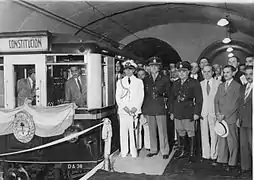 Temporary Boedo station being opened (1944)
Temporary Boedo station being opened (1944) Passengers changing to Line C at the former Constitución station (c.1950s)
Passengers changing to Line C at the former Constitución station (c.1950s)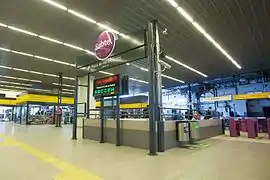
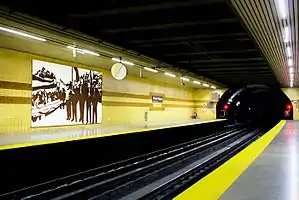 Medalla Milagrosa station
Medalla Milagrosa station Correo Central station being built in front of the Central Post Office
Correo Central station being built in front of the Central Post Office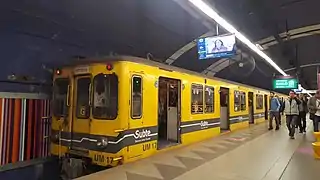 Subway car at Bolivar station
Subway car at Bolivar station
See also
References
- ↑ "Subte: con récord de pasajeros, siguen las quejas por el servicio y busca mejorar con más obras". 13 August 2018. Retrieved 2019-03-21.
- ↑ "En 2018 el Subte transportó la mayor cantidad de pasajeros en 25 años". 20 February 2019. Retrieved 2019-04-05.
- ↑ Línea E: 70 años buscando pasajeros – EnElSubte, June 2014
- ↑ Línea E – Buenos Aires Ciudad.
- ↑ Premetro a Puente de la Noria, en el olvido por el Metrobus del Sur – EnElSubte, August 2013
- ↑ "Metrovías cumple 20 años operando el Subte". enelSubte.com (in European Spanish). 1 January 2014. Retrieved 15 May 2016.
- ↑ Reporte de obra: extensión línea E – EnElSubte, May 2014
- 1 2 Ciudad confirma que la extensión de la línea E abrirá recién en 2017 – EnElSubte, 23 July 2015.
- ↑ Subte E: tras 20 años, extienden la línea más postergada
- ↑ Línea E: 70 años buscando pasajeros – EnElSubte, 20 June 2014.
- ↑ Ferrofilatelia – EnElSubte, 6 June 2010.
- ↑ "Mientras reforman coches de 80 años, desguazan otros más modernos". enelSubte.com (in European Spanish). 17 July 2014. Retrieved 10 January 2016.
- ↑ Metrovías oficializa quita de formaciones – EnElSubte, 4 June 2013.
- ↑ Subtes: el gobierno porteño planea renovar la mitad de la flota para el 2015 – InfoBAE, 23 January 2013
- ↑ Realizarán estudios en Constitución para ubicar la cabecera de la línea F – 1 August 2011
- ↑ Murales alusivos a Moebius en San José – EnElSubte, 18 December 2014.